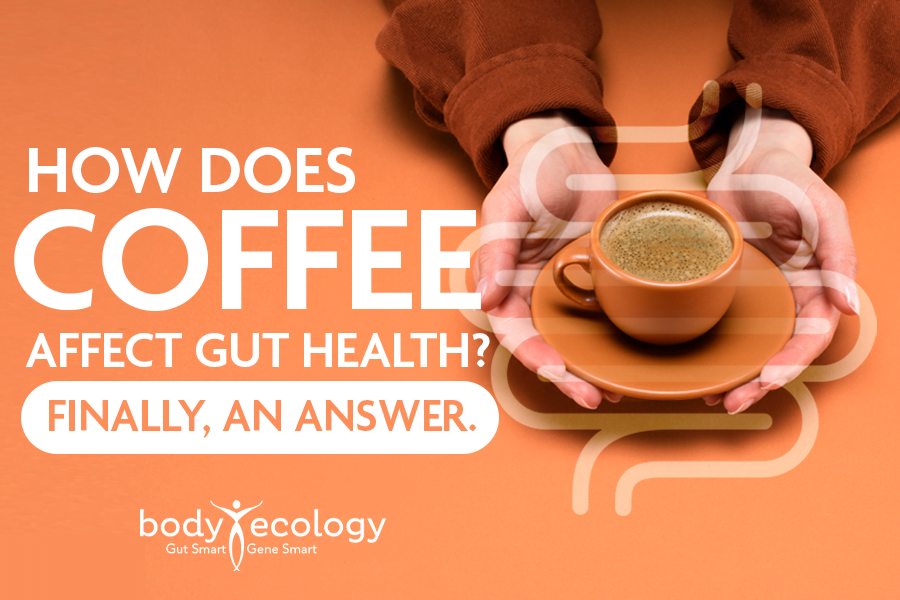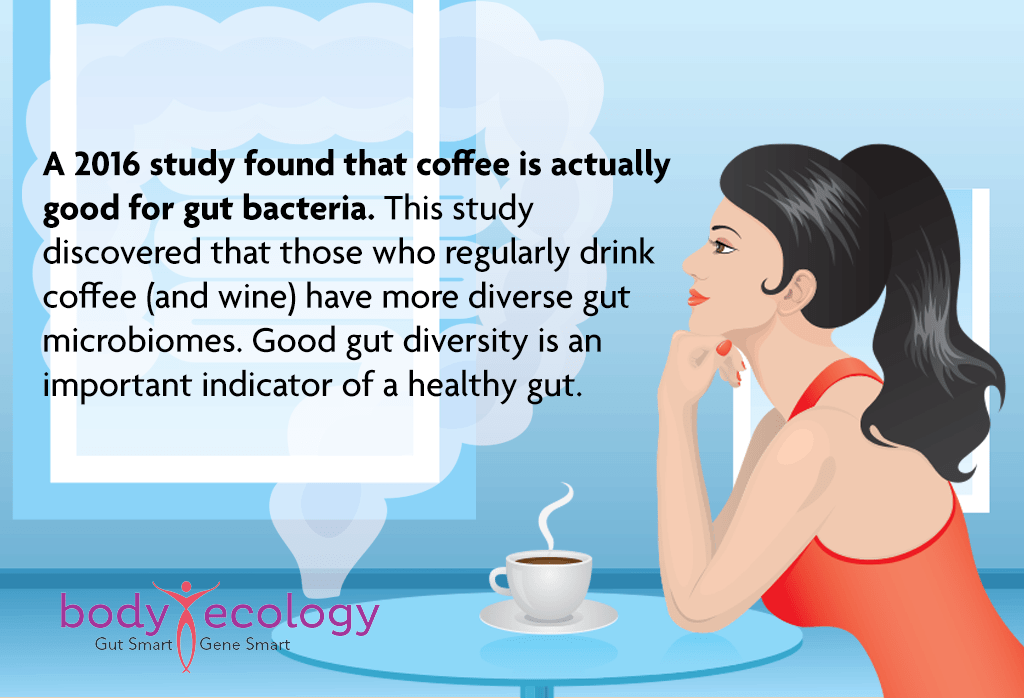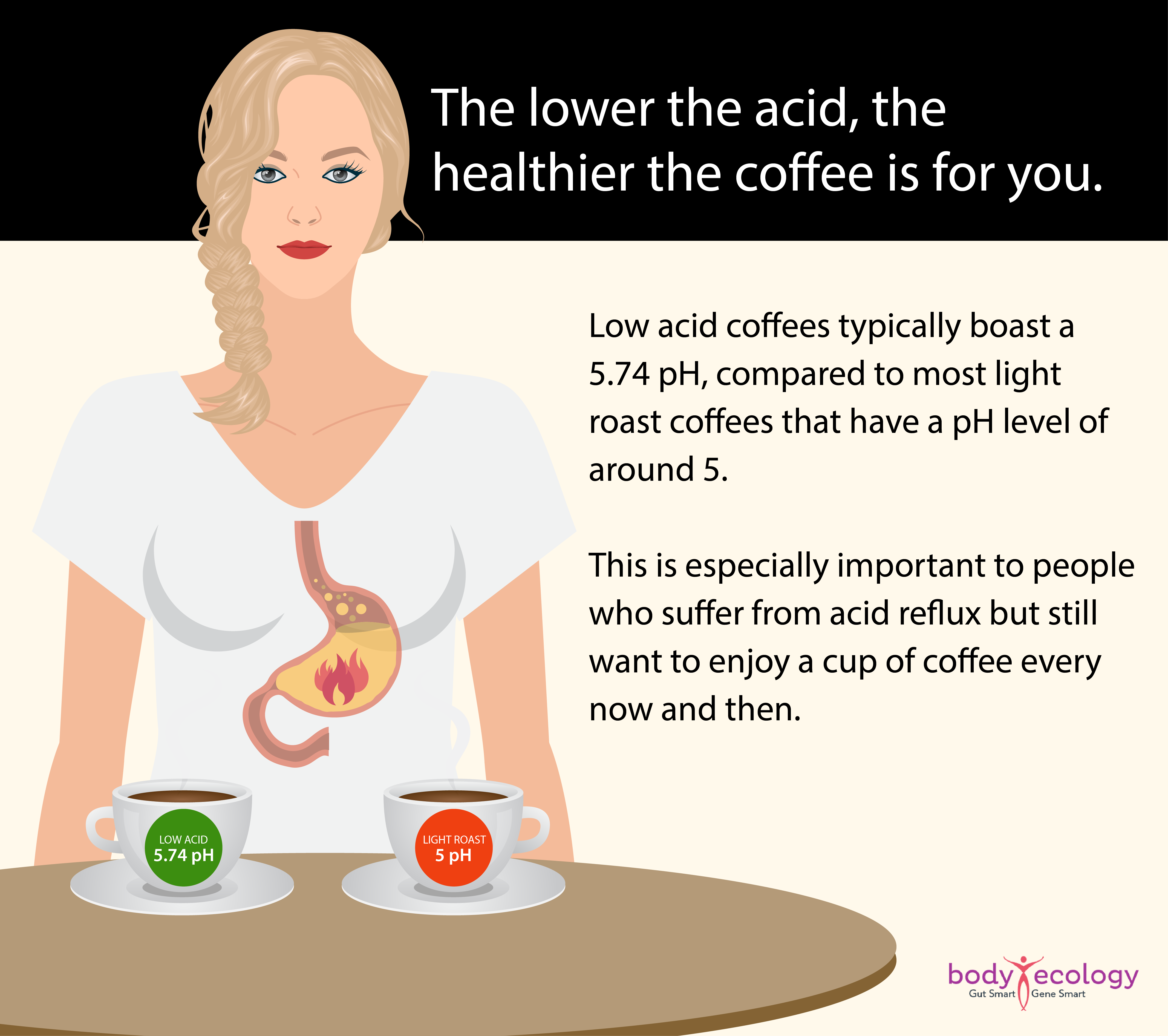
How does coffee affect gut health? Finally, an answer.
Will drinking coffee take a toll on your microbiome? An interesting 2009 study looked at the relationship between coffee and exactly this.1 In it, study participants were given a daily dose of three cups of coffee for three weeks.
 Stool samples were collected before and after they drank the coffee. These samples assessed the effect of the ingestion of the coffee on gut bacteria, including measuring levels of specific bacteria.
Stool samples were collected before and after they drank the coffee. These samples assessed the effect of the ingestion of the coffee on gut bacteria, including measuring levels of specific bacteria.
After the three-week test period:
- Bifidobacterium levels increased, while more dominant strains were not significantly affected.
- Furthermore, subjects displayed increased activity of Bifidobacterium.
To summarize, Bifidobacterium increased in number and in activity in this study, without significantly impacting the dominant strains in the microbiota of volunteers. This is an important finding regarding the health benefits of coffee as Bifidobacterium is one of the most valuable strains of bacteria that can be found in the gut microbiome.
Bifidobacterium is considered a “key strain” of probiotic bacteria and is capable of breaking down milk sugar, complex carbohydrates, and fiber-containing foods in the digestive tract.2

So, what’s the bottom line? Well, the health benefits of coffee depend on your personal gut.3 For some, coffee may be no problem. For others with gastrointestinal challenges, it’s best avoided.
Can you drink coffee if you have leaky gut? Read part 1 of this article to find out.
‘I like a little cream in my coffee.’ Sound familiar?
Are you someone who can’t start your day without your morning coffee? Do you use coffee for a pick-me-up midday? Do you have a cup of coffee (or espresso) after your evening meal? Is it hard to resist the server at your favorite restaurant who asks you, “Would you like an espresso?” as they hand you the dessert menu?
If you have the CTP1A2 variant and can’t metabolize caffeine for hours after you’ve consumed it, then midday or after-dinner coffee or an espresso (or a chocolate dessert) wouldn’t be a wise choice. It’s a guarantee that you’ll be up wide awake all night.
But just to prove how unique we all are, some people prefer to drink coffee at bedtime and say it helps them sleep better. In fact, some people have told me that it helps with their sleep apnea. Could this perhaps be because one of the health benefits of coffee is to help increase circulation?
Add to that the fact that many people, particularly of certain ethnicities, are lactose intolerant (unable to digest lactose, the sugar found in dairy products, after infancy). If coffee doesn’t agree with you, your issue may be with (undiagnosed) lactose intolerance and not with caffeine.
Similar to eating a “healthy” salad and then topping it with a 1,000-calorie ladle of dressing loaded with saturated fat, an innocent cup of coffee with a one-one thousand, two-one thousand, three-one thousand count of sugar from the dispenser and “two inches” of half-and-half now becomes a fat and sugar bomb.
Coffee by itself has only about 3 calories in a cup. Even if you’re not lactose intolerant and have no issues with dairy products, consuming all that sugar and fat in your morning beverage is no way to start the day.
Here are some great ways to customize your morning brew and enhance the health benefits of coffee:
- Substitute a natural sweetener for sugar. Look out for BE Sweet™, Body Ecology’s brand-new natural sweetener launching next month, to use in place of high-calorie sweeteners like agave, honey, and table sugar (with no bitter aftertaste).
- Lactose intolerant or simply looking for a healthier way to get that comfort-food feeling from your cup of coffee? Coconut cream is a delicious non-dairy creamer that provides a very pleasing, creamy experience. We like macadamia milk and oat milk as creamers as well. After testing, we found them to be low in oxalates, while almond and cashew milks are very high in oxalates. Please avoid those if you have yeast in your body.
- Consider spicing up your coffee with a little ground cinnamon, pumpkin pie spice, orange peel, or vanilla extract. These spices add flavor and variety without adding calories, optimizing the health benefits of coffee. With cinnamon, look for the Ceylon variety that supports blood sugar regulation versus Cassia cinnamon, which also supports blood sugar regulation but may be unsafe due to high levels of toxins that may put a strain on the liver.4
-
What do you do when it’s 110 degrees out, and you want your coffee, but it’s just too hot? Fill your cup with ice beforehand and enjoy a cool cup of Joe — just the way you like it.
- There are other considerations, such as espresso coffee versus drip. Espresso is the purist’s form of coffee preferred by most Europeans. One benefit of European-style coffee like espresso is the lack of add-ins. Unlike most American coffee drinkers, Europeans drink their java in its most authentic form — which is usually a good thing. The fewer add-ins, the better. Fewer add-ins mean fewer calories that are often derived from saturated fat and sugar.
- Or, choose different roasting preferences, i.e., a light roast drip coffee versus a medium or dark roast. Each has different properties, including the extracting method and whether it was cool or hot-processed. Each has a unique flavor.
- Another option is to change the acid content of your favorite coffee. These low-acid coffee products are over-processed less often and are not as chemically treated as many of the common brands. New water and steam processes are preferable as they naturally lower the acidity of coffee without sacrificing taste.

Experiment with different brews to find the one you like best
Amounts up to 400 mg of caffeine per day appear to be safe for most adults (about four cups of drip coffee).5 But a study published in the American Journal of Clinical Nutrition reported that high coffee consumption was associated with an increased risk of cardiovascular disease, though unrelated to genetic factors in metabolizing caffeine.6
Ultimately, it’s ”to each their own.” A cup or two of coffee in the morning is likely an indulgence you can afford without any negative health effects. But everyone is different.
If you find coffee difficult to tolerate — if it makes your heart race, makes you jittery, or interrupts your sleep — consider switching to herbal tea, vegetable juice, or another nourishing beverage.
REFERENCES:
- 1. Jaquet, Muriel & Rochat, Isabelle & Moulin, Julie & Cavin, Christophe & Bibiloni, Rodrigo. (2009). Impact of consumption on the gut microbiota: A human volunteer study. International journal of food microbiology. 130. 117-21. 10.1016/j.ijfoodmicro.2009.01.011.
- 2. A., Plumbridge. (2009). Regulation of Carbon Assimilation in Bacteria. Reference Module in Biomedical Sciences. 10.1016/B978-0-12-801238-3.02454-5.
- 3. Zhernakova A, Kurilshikov A, Bonder MJ, Tigchelaar EF, Schirmer M, Vatanen T, Mujagic Z, Vila AV, Falony G, Vieira-Silva S, Wang J, Imhann F, Brandsma E, Jankipersadsing SA, Joossens M, Cenit MC, Deelen P, Swertz MA; LifeLines cohort study, Weersma RK, Feskens EJ, Netea MG, Gevers D, Jonkers D, Franke L, Aulchenko YS, Huttenhower C, Raes J, Hofker MH, Xavier RJ, Wijmenga C, Fu J. Population-based metagenomics analysis reveals markers for gut microbiome composition and diversity. Science. 2016 Apr 29;352(6285):565-9. doi: 10.1126/science.aad3369. Epub 2016 Apr 28. PMID: 27126040; PMCID: PMC5240844.
- 4. Santos HO, da Silva GAR. To what extent does cinnamon administration improve the glycemic and lipid profiles? Clin Nutr ESPEN. 2018 Oct;27:1-9. doi: 10.1016/j.clnesp.2018.07.011. Epub 2018 Aug 13. PMID: 30144878.
- 5. Efsa Panel on Dietetic Products, Nutrition, and Allergies (NDA) (2015). Scientific Opinion on the safety of caffeine. EFSA J. 13:4102. doi: 10.2903/j.efsa.2015.4102.
- 6. Ang Zhou, Elina Hyppönen, Long-term consumption, caffeine metabolism genetics, and risk of cardiovascular disease: a prospective analysis of up to 347,077 individuals and 8368 cases, The American Journal of Clinical Nutrition, Volume 109, Issue 3, March 2019, Pages 509–516, https://doi.org/10.1093/ajcn/nqy297.








